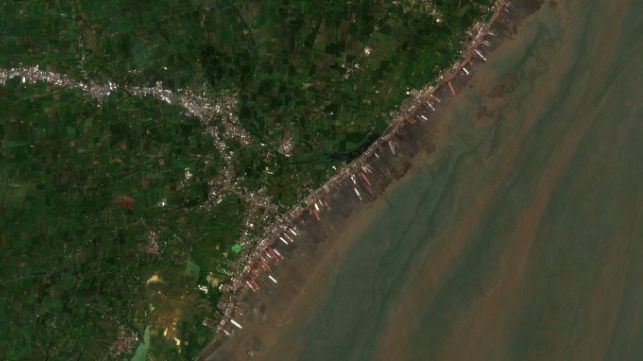NGOs: EU "Can't Have it Both Ways" on Shipbreaking and Hazardous Waste

An analysis by five leading environmental organizations suggests that the EU could violate its own laws and international treaty agreements if it decides to allow the exportation of end-of-life vessels to South Asia.
The overwhelming majority of aging ships are scrapped on tidal flats in Pakistan, India and Bangladesh, and labor and environmental protections at these sites vary. Thanks to local market and regulatory forces, shipbreakers in South Asian localities can pay substantially more for defunct ships, and they attract end-of-life vessel transactions from all over the world.
Under the Basel Convention, end-of-life ships are hazardous waste. Beginning this year, the Basel Ban Amendment prohibits developed nations from sending hazardous waste - including defunct ships - to developing nations. This outright ban entered into effect in December 2019, and its application is limited to certain Basel Ban signatory nations, including EU member states.
The EU, however, has taken a different path. It carved defunct European-flagged vessels over 500 GT out of its definition of hazardous waste in 2013, and it created a second mechanism - the EU Ship Recycling Regulation - to address this waste stream separately, without applying the Basel Convention.
EU SRR-covered ships must be scrapped at an approved facility, and to date, no yard in South Asia has been approved. However, the authors cautioned that this could soon change, and it cited proposals for a bilateral EU deal with a South Asian nation on shipbreaking exports; this proposal would clear the way for EU SRR approval for yards in places like Alang, India's shipbreaking center.
The group warned that authorizing the use of South Asian shipbreakers would undermine the EU's aspirations for a European Green Deal, as well as its commitment to the rule of law.
"The EU can't have it both ways. They cannot project that they promote a new way of thinking with the European Green Deal and prevent exports of hazardous wastes to developing countries, while seeking to bend their existing legal obligations to enable the shipping industry to do just that," wrote a joint committee formed by the Basel Action Network, European Environmental Bureau, Greenpeace and NGO Shipbreaking Platform. "With the entry into force of the [Basel] Ban Amendment, it is now simply impossible to pretend that the EU is acting legally by removing EU flagged ships from Basel [Convention] control."
"We fear that the EU is just fine with human rights, environmental treaties and a ‘green deal’ until it impacts the bottom line of powerful industrial interests. Instead of inventing exceptions to international law, we expect the EU to support its recycling sector and safeguard the environmental justice principles that it championed when supporting the Basel Ban Amendment - and now has put at the heart of its new Green Deal," said Ingvild Jenssen, the executive director and founder of NGO Shipbreaking Platform.
